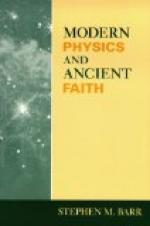This knowledge through intuition is absolute and exact. It is not relatively true. It is absolutely and invariably true. No additional facts will ever modify it, or require a restatement.
When Sir William Hamilton based his Logic on the dictum that “All knowledge is relative, and only relatively true,” the proposition was self-evidently false. It was in itself a statement of absolute knowledge about a certain thing. It was in itself knowledge that was not relative. All knowledge could not be relative if this knowledge was not. This knowledge could not be either absolute or relative without upsetting his whole proposition, for, if relative, then it was not always true; and if absolute, then it was never true.
Sir William did not know the distinction between the two kinds of knowledge, and what he meant to say was that “All knowledge obtained by observation and experience is relative, and only relatively true.”
His knowledge of this relativity was not obtained by observation or from reason. It could not possibly have been obtained in that way. It came from intuition, and it was absolute and exact. A man may have absolute and exact knowledge and yet not be able to put it into words that exactly express it to another. Hamilton had this knowledge. But it was not clearly formulated even in his own mind. He had two separate and distinct meanings for the word “knowledge,” without being conscious of it.
We have yet to coin a proper word to express what comes to us through intuition. The old English word “wisdom” originally did. The old verb “wis” was meant what a man knew without being told it, as “ken” meant knowledge by experience. Try and prove by reason that a straight line is the shortest distance between two points, or that a part can never be greater than the whole, and your reason has an impossible task. “You must take them for axioms,” it says. You must take them because you wis them, not because you know (ken) them.
Intuitional knowledge must not be confounded with the relative knowledge that flows through the reason: that “If the sum of two numbers is one and their difference is five,” the numbers are minus two and plus three.
The point cannot be too strongly enforced that there is a distinction between the sources of what we know, and that while all we know through our sensations is only relatively true, that which we know from intuition is invariably and absolutely true. This is seen through a glass darkly, in theology, where intuition is called inspiration and not differentiated from reason.
The false notion that we can only learn by observation and experience, that the concept can never transcend the observation, that we can only know what we can prove to our senses, has wrought incalculable injury to progress in philosophy.
Because our sensual knowledge of matter begins and ends with vibration in one octave it does not follow that this ends our knowledge of it. We may have intuitional knowledge, and this intuitional knowledge is as susceptible to reason as if we had obtained it by observation.




